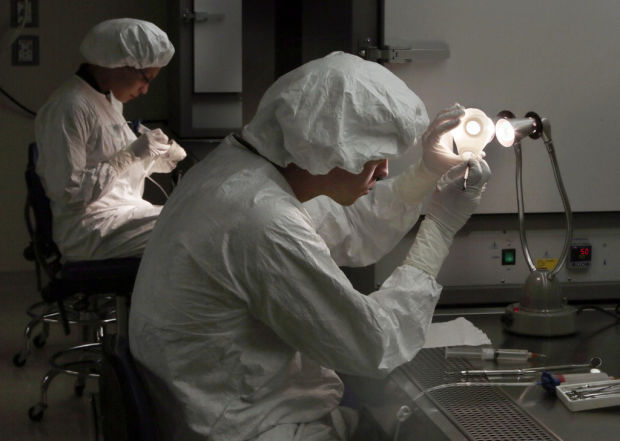It’s turning out to be a record year for Tucson-based SynCardia Systems, which has reached a milestone for implants of its temporary artificial heart.
Today, SynCardia expects the 125th implant of its Total Artificial Heart, which is used to keep heart-transplant patients alive until they receive donor hearts.
The number of implants so far this year equals all implants performed worldwide in 2012, SynCardia said. And for all of 2013, SynCardia projects a single-year record of 180 Total Artificial Heart implants, more than double the number in 2011.
The increase in implants is being driven by increased use of portable heart drivers — pneumatic power sources — and by expanded availability of the artificial heart, the company said.
SynCardia’s Total Artificial Heart replaces the two blood-pumping ventricles and four heart valves, to treat heart failure affecting both sides of the heart (biventricular failure) until a donor heart becomes available.
SynCardia said its implant capacity has grown 300 percent due to its Companion 2 portable driver, which is about the size of a carry-on suitcase and is used after an implant to provide patient mobility around the hospital.
The company is still awaiting final U.S. Food and Drug Administration approval of its smaller Freedom portable driver, which can be worn in a small backpack to allow patients to leave the hospital. In use under an investigational drug exemption, the Freedom portable driver has supported more than 145 patients for the equivalent of more than 75 years, the company says.
The privately held company also is working on a smaller version of the artificial heart for smaller adults and adolescent children, and to allow people who aren’t candidates for transplants to use the heart for ongoing, end-of-life support.
SynCardia’s Total Artificial Heart is now available at 87 certified implant centers worldwide, with an additional 33 heart centers pursuing certification, the company said.
The artificial heart allows stable patients to be discharged from the hospital to wait for a matching donor heart at home, providing robust blood circulation that helps prepare patients for transplant, the company says.
“They are sleeping in their own beds, exercising, eating out and socializing, and some even return to work. They are getting their bodies in better shape for living life and their transplant,” SynCardia CEO and President Michael Garippa said in announcing the implants milestone.
PLUG-IN DAY
In other local technology news, Tucson electric-vehicle enthusiasts will gather this weekend for Tucson Plugs In, part of the National Plug In Day series of events.
The free event is set for 9 a.m. to 3 p.m. Sunday at Bookmans Sports Exchange, 3330 E. Speedway, where the city’s first so-called Level 3 “fast charger” was recently installed.
Tucson Plug In is presented by the Tucson Electric Vehicle Association, with sponsorship by Plug In America, the Electric Auto Association and the Sierra Club.
The event will feature plug-ins owned by local EVers and displayed by local auto dealers, along with a variety of exhibits on sustainable technologies. Among the cars on display, organizers expect one of BMW’s new i3 plug-ins to be on hand.
For more information, see the event website at tucsonplugsin.blogspot.com.





